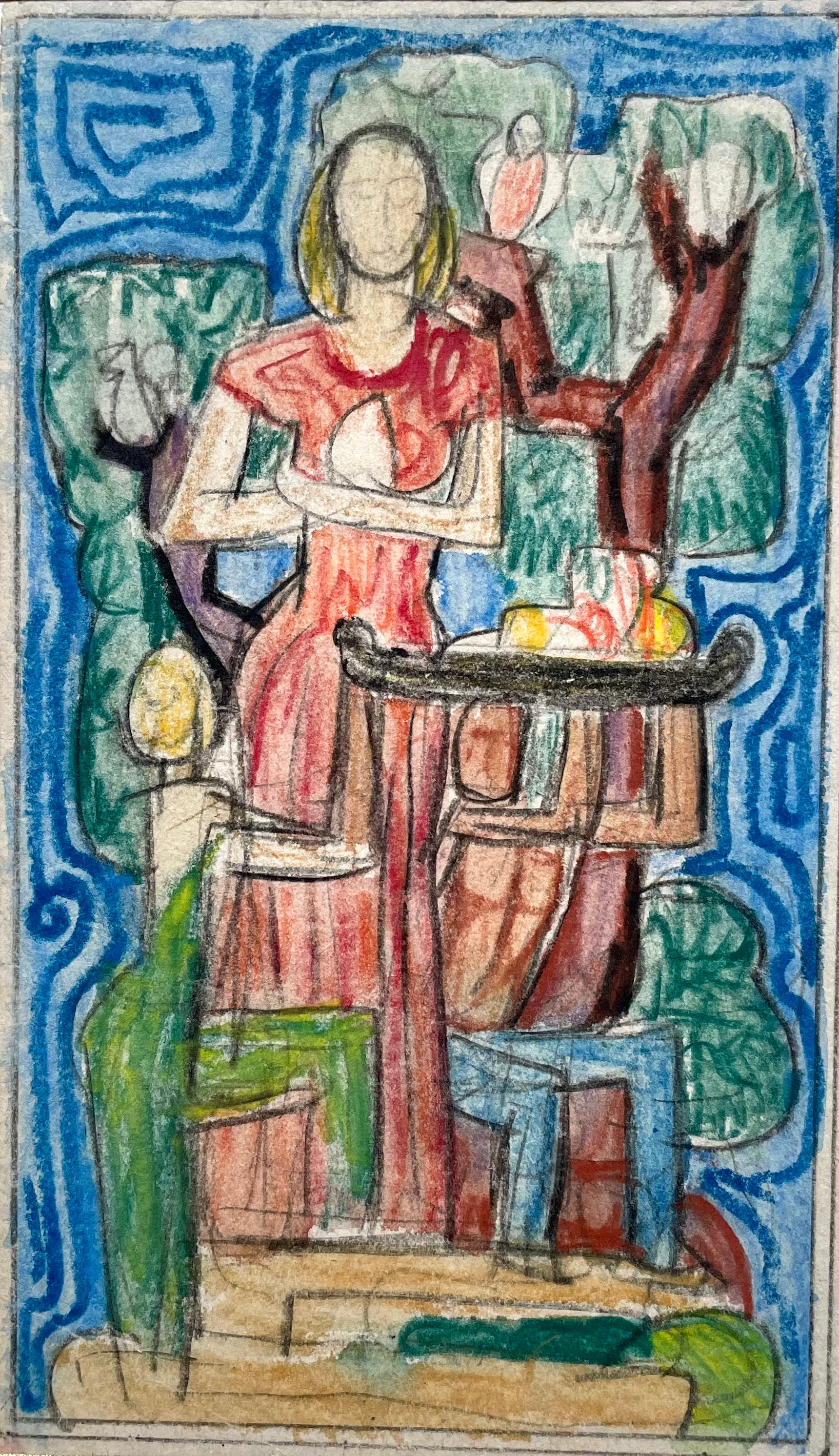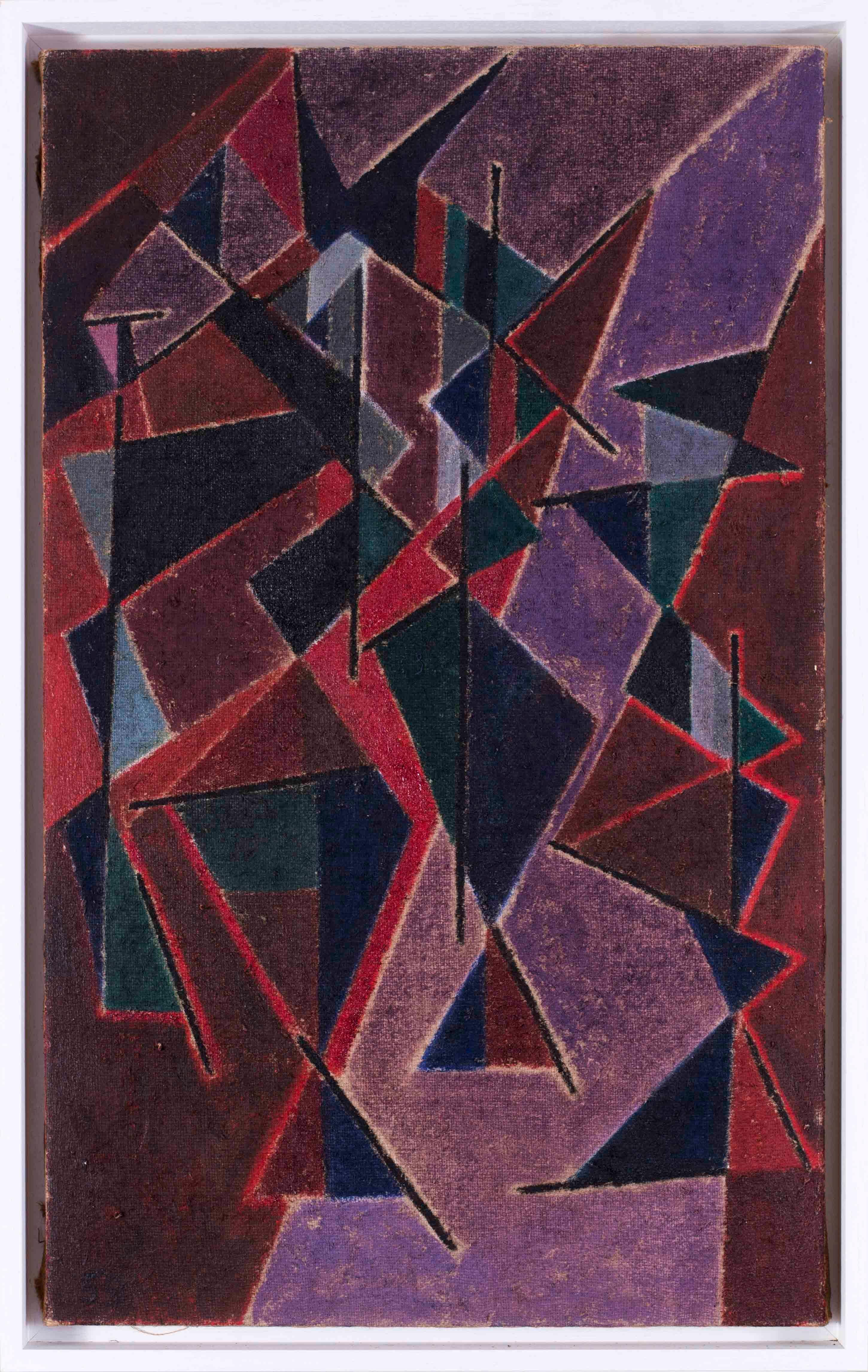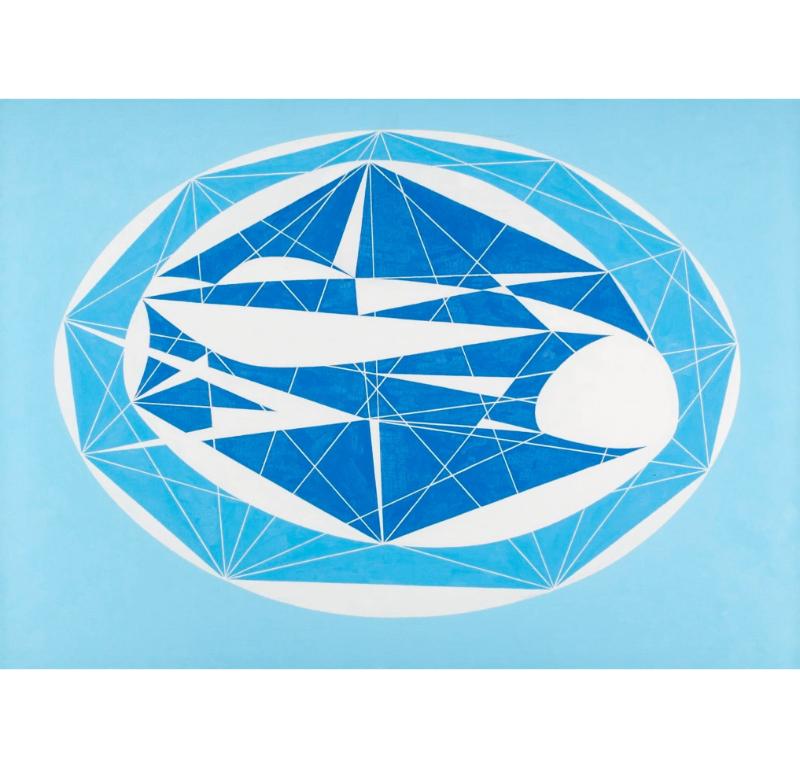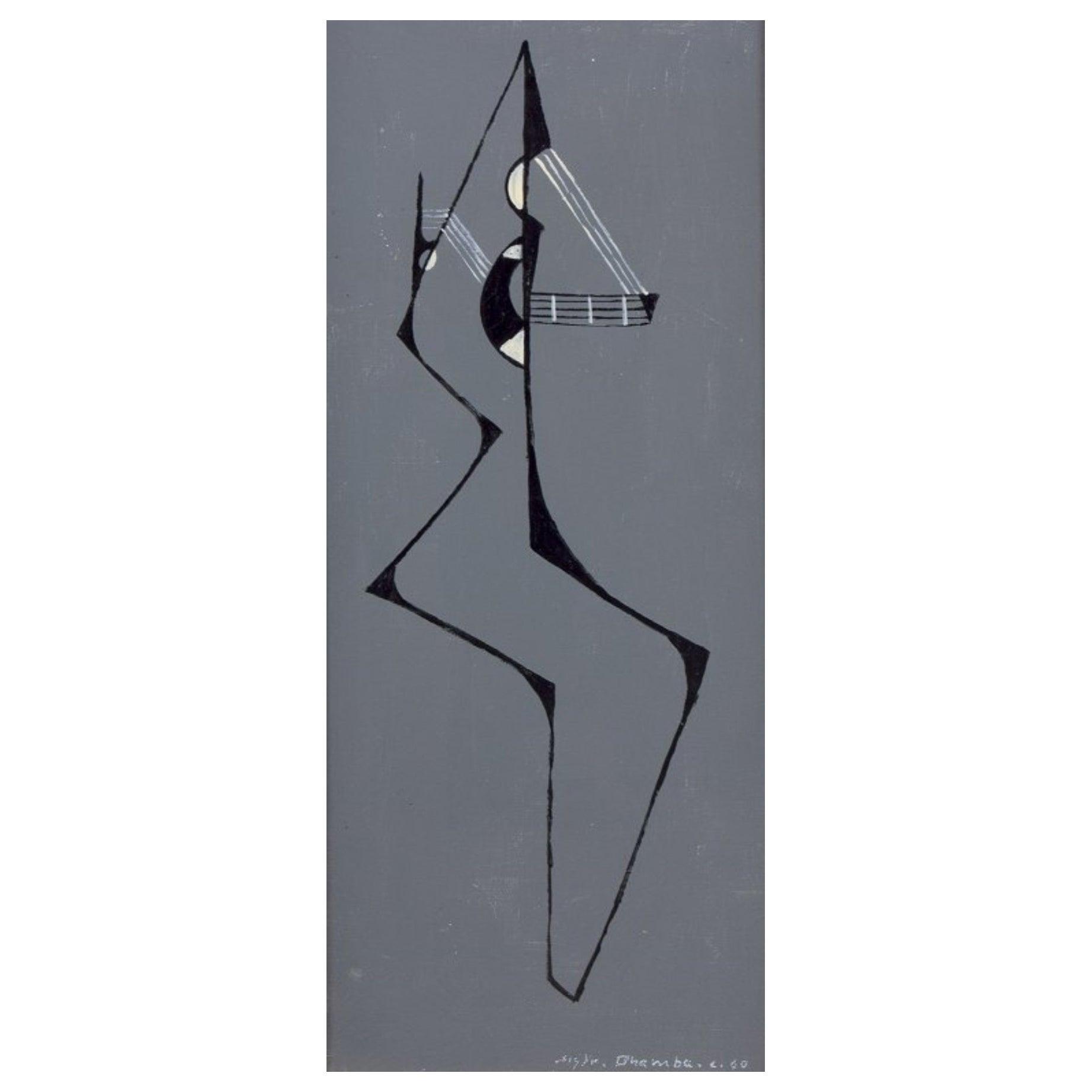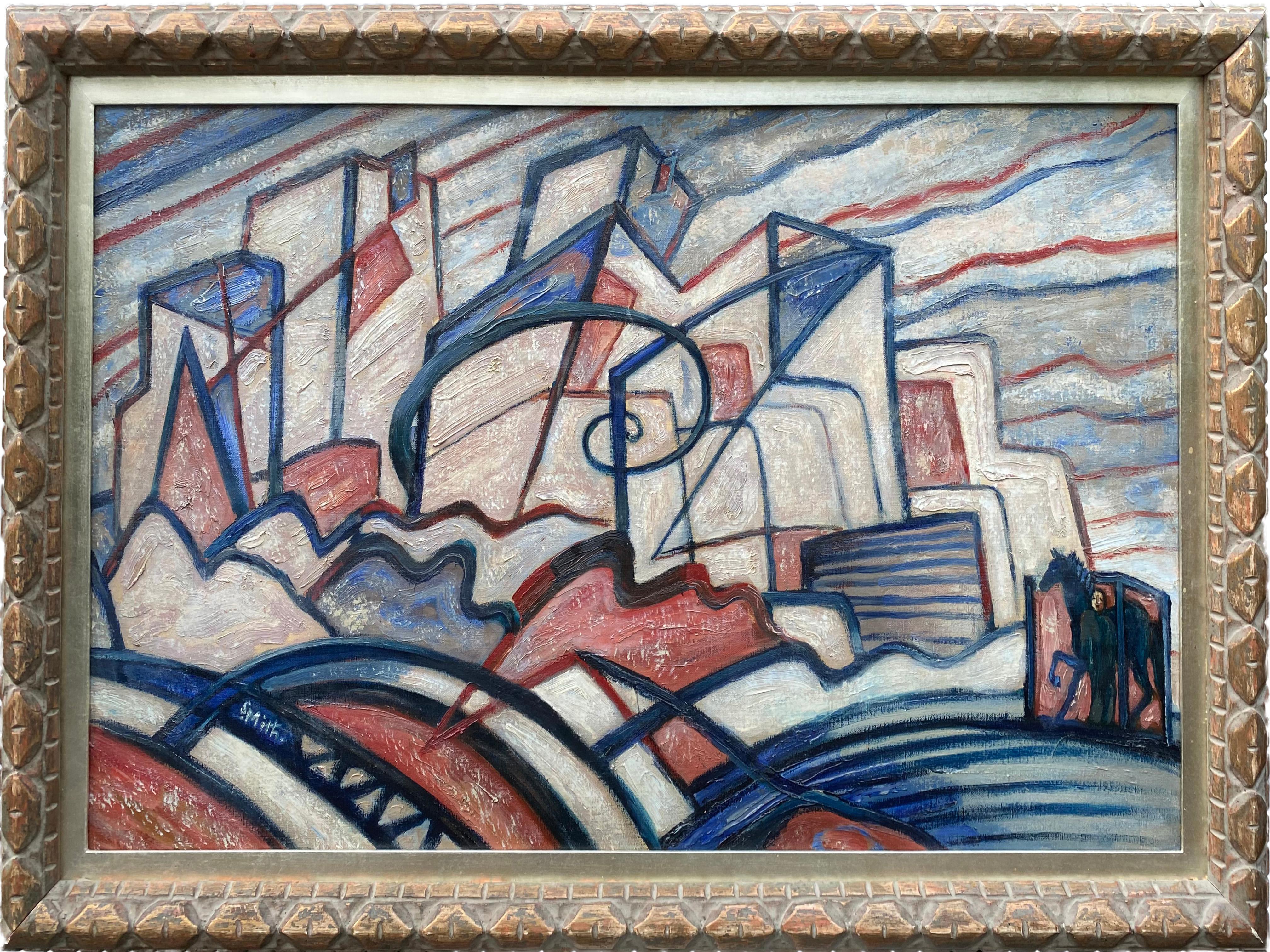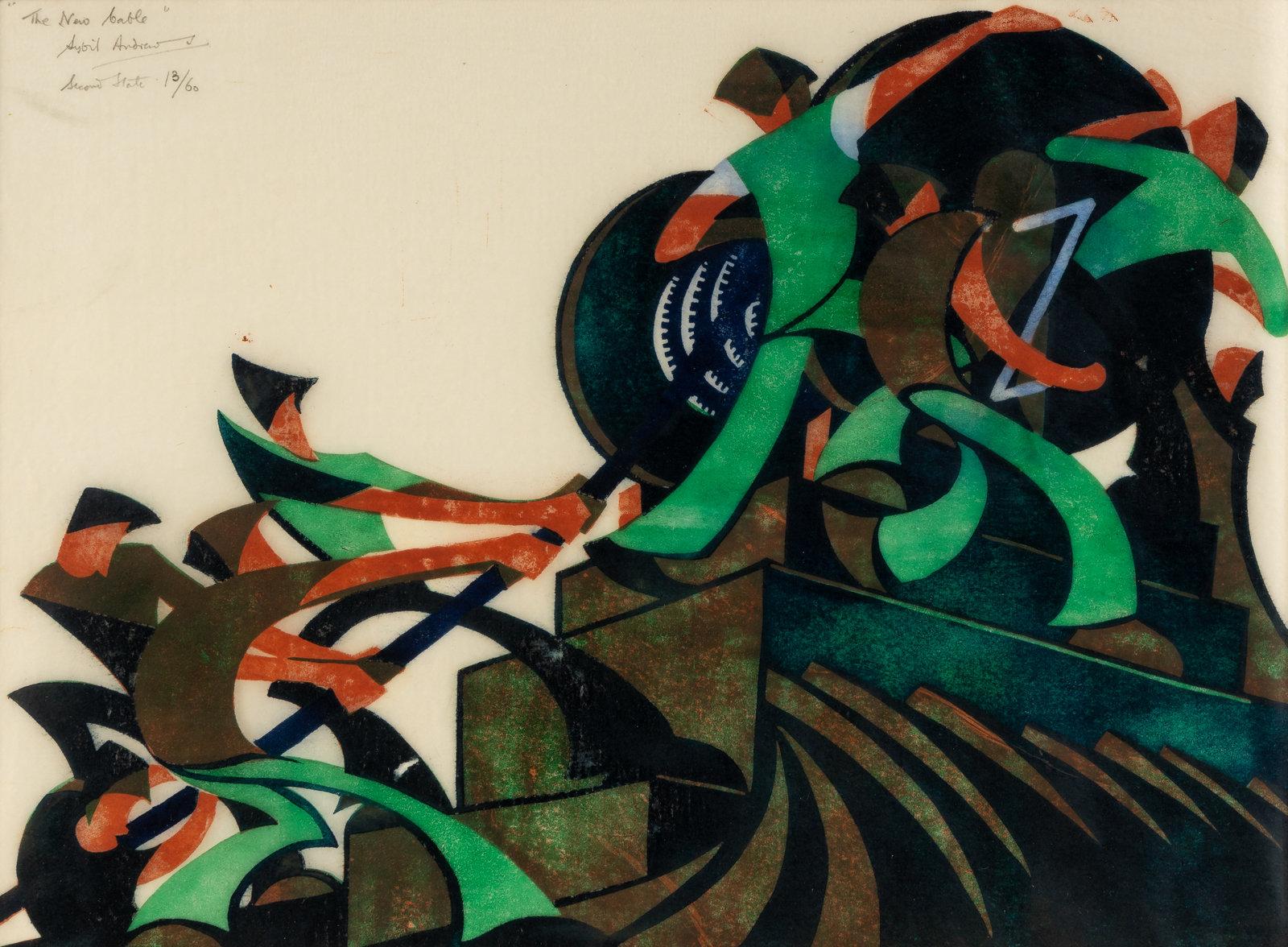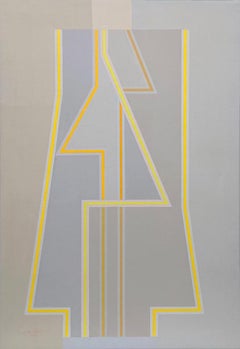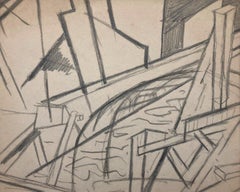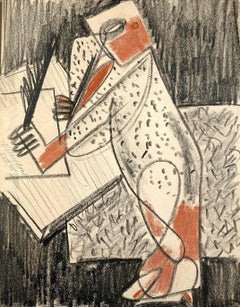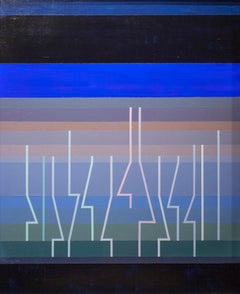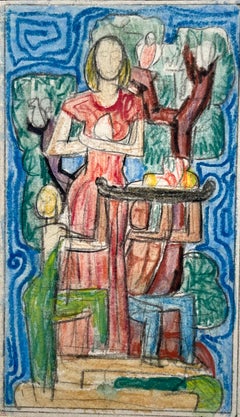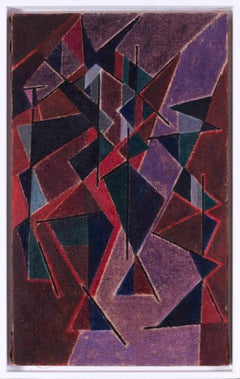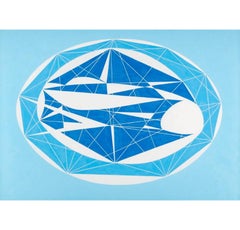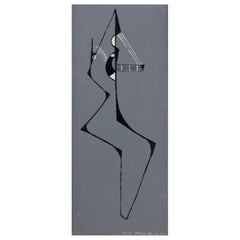Items Similar to A Magnificent 1931 Art Deco Painting by Master Artist John Storrs
Want more images or videos?
Request additional images or videos from the seller
1 of 8
John StorrsA Magnificent 1931 Art Deco Painting by Master Artist John Storrs1931
1931
$25,000
£18,979.57
€21,708.58
CA$34,928.63
A$38,848.26
CHF 20,285.35
MX$472,741.95
NOK 259,074.90
SEK 242,966.55
DKK 162,019.48
Shipping
Retrieving quote...The 1stDibs Promise:
Authenticity Guarantee,
Money-Back Guarantee,
24-Hour Cancellation
About the Item
A magnificent 1931 Art Deco painting by master artist John Storrs. Artwork size: 18" x 12". Framed Size: 21 1/4" x 21 3/4". In a handsome, dark frame.
Provenance:
- Downtown Gallery, New York, NY, 1969 (titled as #4 Composition)
- Robert Henry Adams Fine Art, Chicago, IL, 1998
John Storrs is arguably the most famous sculptor to hail from Chicago. Born in Chicago, Storrs spent much of his adult life in France. He studied with Lorado Taft at the Art Institute of Chicago, Charles Grafly at the Pennsylvania Academy and then in France with August Rodin. Storr’s most notable commission is the 33-high foot sculpture of “Ceres” that is on top of Chicago’s Board of Trade building. Storr’s sculptures can be found in major museum collections worldwide. He died in Mer, France in 1956.
- Creator:John Storrs (1885 - 1956, American)
- Creation Year:1931
- Dimensions:Height: 21.25 in (53.98 cm)Width: 21.75 in (55.25 cm)
- More Editions & Sizes:Framed size: 21 1/4" x 21 3/4Price: $25,000
- Medium:
- Movement & Style:
- Period:
- Condition:See Photos.
- Gallery Location:Chicago, IL
- Reference Number:Seller: #183801stDibs: LU2591214911122
About the Seller
5.0
Recognized Seller
These prestigious sellers are industry leaders and represent the highest echelon for item quality and design.
Established in 2000
1stDibs seller since 2023
71 sales on 1stDibs
Typical response time: 5 hours
- ShippingRetrieving quote...Shipping from: Chicago, IL
- Return Policy
Authenticity Guarantee
In the unlikely event there’s an issue with an item’s authenticity, contact us within 1 year for a full refund. DetailsMoney-Back Guarantee
If your item is not as described, is damaged in transit, or does not arrive, contact us within 7 days for a full refund. Details24-Hour Cancellation
You have a 24-hour grace period in which to reconsider your purchase, with no questions asked.Vetted Professional Sellers
Our world-class sellers must adhere to strict standards for service and quality, maintaining the integrity of our listings.Price-Match Guarantee
If you find that a seller listed the same item for a lower price elsewhere, we’ll match it.Trusted Global Delivery
Our best-in-class carrier network provides specialized shipping options worldwide, including custom delivery.More From This Seller
View AllA 1980 Pastel Abstract Geometric Painting by ID Artist Eugene Dana
Located in Chicago, IL
A 1980 pastel, Abstract Geometric painting by Institute of Design Artist Eugene Dana. Titled: Homage to Boutet de Monvel. Artwork size:
35 1/2" x 23 1/2". Framed size: 37" x 2...
Category
1980s Abstract Geometric Abstract Paintings
Materials
Canvas, Acrylic
A Cubist, Untitled Mural Study of a City Scene by Artist Rudolph Weisenborn
By Rudolph Weisenborn
Located in Chicago, IL
A graphite on paper, untitled mural study, Cubist city scene by important Chicago Modernist artist Rudolph Weisenborn, ca. 1940. Artwork size: 9 3/4" x 11 3/4". Archivally matted to 16" x 18". Provenance: Estate of the artist.
Rudolph Weisenborn was born in Strassburg, Germany in 1881, but was orphaned at the age of nine. He was taken-in by Mid-Western farmer Thomas Westaby and spent his early years in Wisconsin, Iowa and North Dakota. Weisenborn first attended the University of North Dakota in 1898, then the Students School of Art in Denver. Various accounts have him working out west as a gold miner and cowboy.
Around 1912, he settled in Chicago and worked as a window designer for Marshall Field’s. Weisenborn is best known as the founder of the Chicago No-Jury Society of Artists. The group was founded because many artists could not get their work accepted into the mainstream Art Institute shows. Weisenborn is quoted as saying that he harbored feelings of disdain for any jury and that his own paintings were frequently rejected by conservative jurors. He was also involved and helped found other radical artist’s groups such as the Salon des Refuses, Cor Ardens and Neo-Arlimusic. In 1936, he helped found the New York-based American Abstract Artist’s Group. He created the only abstract mural for the 1933 Century of Progress Exhibition in Chicago and also worked for the Federal Arts Project in the Easel Division. His WPA murals can be found in Crane Technical High School and Nettlehorst Elementary School in Chicago, IL. In 1945, Chicago businessman Herman Spertus...
Category
1940s Cubist Abstract Drawings and Watercolors
Materials
Paper, Graphite
A Dynamic 1945 Mid-Century Modern Cubist Studio Scene, Artist Sketch Class
By Harold Haydon
Located in Chicago, IL
A Dynamic, 1945 Mid-Century Modern Cubist Studio Scene, Artist's Sketch Class by Noted Chicago Painter, Harold Haydon (Am. 1909-1994). Artwork size: 11 x 8 1/2 inches, unframed, mo...
Category
Mid-20th Century Cubist Abstract Drawings and Watercolors
Materials
Paper, Charcoal, Pastel
Large & Bright Painting Titled, "Night Fete Champetre" by ID Artist Eugene Dana
Located in Chicago, IL
A large & bright Abstract Geometric painting titled, "Night Fete Champetre" by Institute of Design artist Eugene Dana. Artwork size: 37" x 30". Framed size: 38" x 31". Provenance...
Category
1980s Abstract Geometric Abstract Paintings
Materials
Canvas, Acrylic
A Charming 1939 Landscape Painting Depicting Alabama by Harold Haydon
By Harold Haydon
Located in Chicago, IL
A charming & diminutive landscape, oil on paper painting, dated 1939 & titled "Alabama" by artist Harold Haydon. The painting is framed in a rustic, wood frame. Image size: 4 1/2"...
Category
1930s American Modern Landscape Paintings
Materials
Paper, Oil
A Captivating 1950s Textile Design by Artist Andre Delfau
By Andre Delfau
Located in Chicago, IL
A captivating 1950s textile design in black and brown ochre tones with wedge star pattern by noted set and costume designer Andre Delfau.
Born in Par...
Category
1950s American Modern Abstract Drawings and Watercolors
Materials
Ink, Gouache, Graphite, Paper
You May Also Like
Plenty - 1930s British Art Deco design for a Mural by Harry Carleton Attwood
Located in London, GB
HARRY CARLETON ATTWOOD
(1907-1985)
Plenty - Design for Eltham Palace
Chalks
Framed
20.5 by 12 cm., 8 by 4 ¾ in.
(frame size 39.5 by 31.5 cm., 15 ½ by 12 ½ in.)
Attwood was born i...
Category
1930s Art Deco Figurative Drawings and Watercolors
Materials
Chalk
Abstract, mid 20th Century French original oil painting by Pierre Jourda
By Pierre Jourda
Located in Petworth, West Sussex
Pierre Jourda (French, 1931 – 2007)
Pine Trees
oil on canvas
89 x 55 cm.
Provenance: From the studio sale of the artist
Category
Mid-20th Century Abstract Abstract Paintings
Materials
Canvas, Oil
$2,055 Sale Price
40% Off
Painting, Oil on Canvas Board by Arthur Jackson, 1937
Located in Kingsclere, GB
Painting, Oil on Canvas Board by Arthur Jackson 1911-2003, 1937
Additional information:
Medium: Oil on canvas board
49 x 70 cm
19 1/4 x 27 1/2 in
Signed, titled, dated and inscribed...
Category
20th Century Abstract Paintings
Materials
Canvas
Price Upon Request
Sigfrid Bhamba, listed Swedish artist. Oil on canvas. Cubist composition.
Located in København, Copenhagen
PRE-OWNED GOODS ARE EXEMPT FROM IMPORT TARIFFS FOR U.S., UK, AUSTRALIAN & CANADIAN CUSTOMERS.
THEREFORE, NO IMPORT TARIFFS WILL BE APPLICABLE TO YOUR PURCHASE.
Sigfrid Bhamba, a...
Category
Vintage 1960s Swedish Modern Paintings
Materials
Canvas
1936 American Modernist "The Earth Trembled" ACA Gallery Label
Located in New York, NY
American modernist Harry Knox Smith (New York, 1879-1957) was known for his figure, genre, and still life paintings.
This painting is titled "The Ear...
Category
Early 20th Century Modern Paintings
Materials
Canvas
The New Cable British Modern Mid 20th Century Vorticist European Vorticism Woman
By Sybil Andrews
Located in New York, NY
The New Cable British Modern Mid 20th Century Vorticist European Vorticism Woman
Sybil Andrews CPE (British/Canadian, 1898-1992)
"The New Cable," 1931
12 x 16 1/2 inches
Color linocut
Signed, titled, inscribed 'Second State', and numbered 13/60 in pencil
Framed: 19 x 24 inches
Literature: Coppel Sa17
Illustrated on page 10 of the catalog
The proposed edition of the first state of the Giant Cable was 50, but only 30 impressions were pulled. Andrews removed the blue background for the second state, which was published under the title The New Cable in an edition of 60.
BIO
Sybil Andrews was a printmaker, painter, graphic artist and educator who was born in Bury St. Edmonds, Suffolk, England. She moved to London (England) in 1922. In 1947, she emigrated to Campbell River (Vancouver Island) British Columbia, Canada, where she worked, taught and lived for the rest of her life. She died at a hospital in Victoria (B.C.)
Her mediums were the colour linocut (1) (most famous), etching, posters, pastels, ink, watercolour, monoprint and oil. Her subjects were human activity (at work, sports, travel, etc.), figures, animals, genre, allegory, architecture and landscape. Her style was Art Deco (see AskART styles), Futurism, Cubism and Vorticism (2). Her work is identified by a simple format, clean lines, distortion, vivid colours, drama and rhythm.
Quote: "The colour linocut was just the medium for me, being interested in dynamics and ideas and patterns... It is impossible to be fussy with lines, you have to simplify, you are forced to simplify your idea to its fundamentals." Andrews produced 76 linocuts in her life, of which 43 were made from 1929 to 1939, which is considered to be her best period.
John Hassall's art correspondence course (1918) was the beginning of her formal art education. She went from there to Heatherley's School of Fine Art (London/1922) where she studied under Henry Massey (see AskART) and met artistic partner Cyril Power (see AskART). At the same time, she studied independently with sculptor Henri Glicenstein (see AskART) who taught her drypoint etching and to draw from life.
She also attended the Grosvenor School of Modern Art (1925). Iain McNab (1890-1967) was Principal and Claude Flight (3) (see AskART) an instructor who had a great influence on her choice of linocut as a primary medium. Some of his other students and her associates were Edith Lawrence (1890-1973), Lill Tschudi (1911-2001), Eileen Mayo (see AskART) and William Greengrass (1896-1970). After emigrating to Canada she taught art continuously until a month before her death.
She was elected a member of the Canadian Painters - Etchers Society (after 1976 the Print and Drawing Council of Canada) in 1951.
She began exhibiting her work in 1921.In 1929 she was included in "The First Exhibition of British Linocuts...
Category
1930s Modern Figurative Prints
Materials
Linocut
More Ways To Browse
Art Deco Artists
Vintage Adult Art
12 Foot Art
French Art Deco Painting
1930 Art Deco Painting
Art Deco Oil Painting
Art Deco Chicago
Vintage Art Deco Artwork
French Masonite Paintings
American Gothic Painting
Robert C Jackson
Rothschild Collection
The Starry Night
Austin Thomas
Hand Painted Mandala
London Calling
Swimmer Abstract
Swiss Flag
